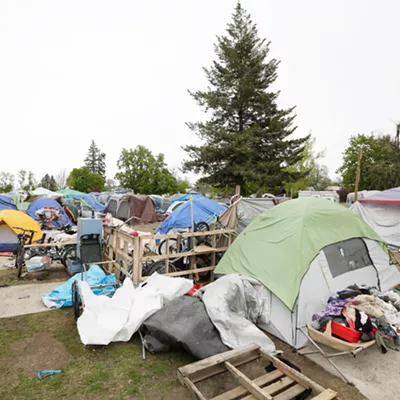As packed outdoor crowds defied public health guidance last year, the specter of death stalked the beaches of Florida last May. Thankfully, it was only the specter of death. An attorney dressed up as the Grim Reaper, prophesying doom upon Florida’s reopening beaches and parks. But he was wrong.
The fear last year that big outdoor events — from anti-mask rallies to racial justice protests — would become major “superspreader” events turned out to be groundless. In truth, the beach was one of the best places to be during the pandemic: Indoors, the virus built up in the air, but outside it generally dispersed quickly and harmlessly.
At least one study last year suggested that being outside was 19 or 20 times safer than being indoors. Simply stepping into the fresh air was like being temporarily vaccinated.
But viruses have this nasty habit of changing. That’s why last month’s Watershed event was such a watershed event.
The Watershed Music Festival, a three-day country music extravaganza at Central Washington’s Gorge Amphitheatre, kicked off on July 30. Watershed was held entirely outdoors. But public health authorities at Grant County have determined that at least 225 of the roughly 25,000 attendees likely contracted COVID-19 at the festival. Comparisons are messy, but adjusted for the size of event, that's appears to be a significantly higher rate of cases than have been spreading in Grant or Spokane County.
The suddenly dominant delta variant of the coronavirus had already filled the nation’s hospital beds with COVID patients. Watershed had suggested that not even outside was safe.
Bill Burke, the organizer of Spokane’s Pig Out in the Park, saw huge implications for the safety of the 100,000 attendees he was projecting would attend the five-day food festival between Sept. 1 and Sept. 6.
“Do the math: An event of a fourth our size... produces hundreds of infections,” Burke says. “I would never wish our event to be mired in that kind of reputation. How do you think people feel if a child were to get this? Oh my word.”
On Tuesday last week, he officially pulled the plug.
"Rather than endanger somebody, we can live one year without Pig Out,” Burke says. “It'll be back next year."
Of course, that’s what everyone thought when Pig Out was canceled last year, too.
Meanwhile, organizers looking at the same information are still running full speed to put on Hoopfest, Spokane’s iconic 3-on-3 basketball tournament, knowing full well that there’s a chance — Hoopfest Executive Director Matt Santangelo pegs it at maybe 20 percent — that the tournament might be canceled.
“I’m not completely tone deaf,” he says. “Believe me, I'm getting blown up on a pretty regular basis, because we’re trying to hold this event.”
He says the public’s reaction seems evenly split.
“Fifty percent is: ‘Spokane needs this, we believe in Hoopfest, we want this to happen,’” Santangelo says. “And 50 percent, ‘Are you sure you’re doing the right thing? Are you seeing the uptick in cases?’”
That’s why, Santangelo says, Hoopfest has been in constant conversation with health experts and local leaders. On Monday afternoon, he was scheduled for a call with MultiCare Health System, one of Hoopfest’s partners.
“It weighs on me. It weighs on you. It weighs on the collective ‘us,’” Santangelo says. “Because you don’t really know what the right thing to do is. It’s hard to assess what the collective risk is.”
Jon Snyder, former Spokane city councilman and Washington Gov. Jay Inslee’s senior policy adviser for outdoor recreation, has spoken to multiple event organizers in Spokane about how to navigate the pandemic.
“I really haven’t been telling anybody to cancel,” Snyder says. “It’s been more like consider the risk. Figure out how you can do it safely.”
But delta, some reports indicate, is twice as infectious as earlier strains. Seth Cohen, medical director of infection prevention at University of Washington Medical Center, suggests delta is also stealthier. It’s more likely to spread early on, before symptoms appear. He says delta doesn’t actually appear to need superspreader events to spread widely. Regular events work just as well.
While delta may have increased the risk of contracting COVID outside, it definitely increased the risk inside. A guy walks into a bar, Cohen says, and rapidly infects eight people.
“Delta indoors, it’s just so highly, highly contagious,” Cohen says. “As a gut feeling it is still orders of magnitude safer to be outdoors than indoors, even though we’re dealing with a much more contagious virus.”
He doesn’t know for sure. Science takes time, and a virus is a mutating target. But asked if he feels safer indoors with a mask versus outdoors without a mask, Cohen still chooses the outdoors.
“Of course, it depends on how many people we’re talking about,” Cohen says. “I'm not sure I feel safe being outdoors at a music festival right now.”
Pig Out would have been a massive success, Burke says.
“We had more vendors this year signed up. We had more co-sponsors signed up,” Burke says. “We were all ready to go. Ads all done, schedules all done, contracts all signed, insurance, licensing, everything ready to go.”
Francisco Velázquez, the Spokane County Regional Health District’s interim health officer, says Burke’s team had presented a safety plan to the health district’s workgroup.
“They had wonderful ideas about precautions; they had all the mechanisms in place,” Velázquez says. “We had actually gotten them 35,000 masks to be provided to attendees.”
But Burke says every day he was hearing more stories about more cases, more people hospitalized, more people dying.
At Pig Out, most attendees would be eating. Most of them would have their masks off. And judging by Spokane County’s stats, Burke guesses, about half of them would be unvaccinated.
“We’re victims of our own success,” Burke says of Pig Out. “You’ve been there, shoulder to shoulder with everybody. … How do I prevent transmission in that environment?”
Hoopfest, by contrast, will only have about half as many teams playing as usual — just under 3,200.
“Normally, at Hoopfest, it’s shoulder to shoulder and it’s packed,” Santangelo says. “That’s not the case this year.”
The lower numbers let Hoopfest organizers spread out the courts, and even put up empty courts in the middle to give more room. He also suspects that some of the more vulnerable would-be-spectators will stay home.
“People are not just going to be wandering through downtown,” Santangelo says. “Just organically, our crowds are going to be thinned out. We won’t have the same congestion points.”
Snyder, Inslee’s outdoor recreation adviser, says he’s less concerned about the people playing and watching games at Hoopfest and a lot more about those people going out to drink and eat indoors afterward.
Epidemiological calculations get complicated the minute the human variable gets dropped into the equation. Does holding Hoopfest result in packed indoor bars? If you cancel an outdoor food festival like Pig Out, do those would-be attendees eat in crowded indoor spaces instead?
Even the lessons of an event like Watershed may offer less clarity than some assumed. Snyder notes that there were no identified cases stemming from the Brandi Carlile concert a few days later.
Misty Aguilar, spokeswoman for the Grant County Health District, says Watershed was unusual in the sheer amount of potential time it offered for exposure: It stretched three days, including two nights of overnight camping.
The district has already removed a handful of cases from the tally of those who contracted COVID at Watershed after further investigation.
Figuring out where a person got COVID is a messy science: Did they contract COVID during Watershed or before the festival began? Did they catch it from the festival audience during a show, or from a passenger on the ride over or in the tent sleeping overnight?
The shame around COVID doesn’t make it any easier.
“Nobody wants to go to the doctor and say, ‘Yeah, I went to Watershed,’” Aguilar says. “People are hanging up. They don’t want to talk to us. Or they’re really sick. They can’t get out of bed to answer the phone.”
That pushback is a reason Grant County hasn’t been able to answer one of the most crucial questions: How many of the Watershed attendees who came down with COVID were vaccinated?
The delta variant has more resistance to vaccines than the original strain. But while vaccinated people are sometimes spreading COVID, they are still less likely to get infected and, when they do, are both less contagious and contagious for a shorter period of time.
“What we’re seeing in the hospitals, and particularly the most severe cases, is it’s really preying on people who are, I’d say, 10 times out of 10 unvaccinated,” Cohen says. “Maybe I’d say 99 times out of 100.”
Inslee isn’t looking at reimposing complicated capacity mandates from last year on outdoor venues, Snyder says. But he says the governor is considering imposing vaccine mandates on big events.
Many companies have already chosen that path. Starting in October, Live Nation, the ticket-selling behemoth that operates Watershed, will require proof of vaccination or a negative COVID test in order to attend concerts. AEG, the Live Nation competitor that puts on concerts at Riverfront Park’s Pavilion, is already operating under that policy.
But anyone getting a Moderna or Pfizer vaccine today won’t be considered fully vaccinated by the time Hoopfest starts.
For now, Hoopfest isn’t requiring masks, but Santangelo says that’s still being considered. He says practically everything — from vaccine mandates to testing requirements to single-entry gates — has been considered.
“We want to run Hoopfest. We want to run it safely, but we want to run it,” Santangelo says. “It’s not an easy spot to be in for sure.” ♦























